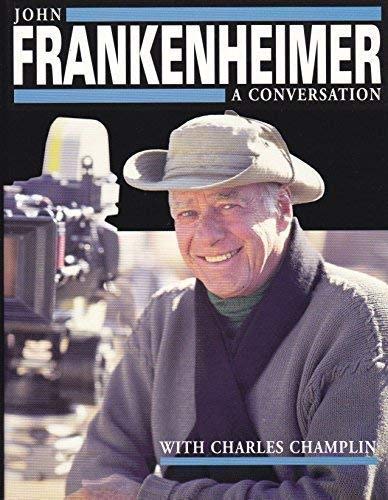A lively film-related biography structured entirely as a long conversation, with relevant quotations from friends and co-workers contained in the margins. The subject is the late filmmaker John Frankenheimer, interrogated about his forty-plus year career by film critic Charles Champlin.
Frankenheimer, for those who don’t know, was the brilliant but highly erratic fellow who brought masterworks like THE MANCHURIAN CANDIDATE, SEVEN DAYS IN MAY and SECONDS to the screen. He was also responsible for less-than-masterful items like the 1979 PROPHECY, the abominable Don Johnson vehicle DEAD-BANG and 1996’s even-worse ISLAND OF DR. MOREAU remake (which isn’t covered in this book).
Champlin wisely keeps his questions and commentary brief, letting Frankenheimer tell his story in his own words. He proves an engaging raconteur, and is supported by numerous well-chosen quotes–my favorite is the following “compliment” from actor Esai Morales: “Frankenheimer is the best director I’ve ever worked with, period. He’s not playing any kind of weird passive-aggressive mind games. He just screams at everybody.”
Frankenheimer gabs at length about his early days directing live television for STUDIO ONE, PLAYHOUSE 90 and other 1950s-era programs. Frankenheimer helmed over 100 TV dramas back in the day, including adaptations of THE TURN OF THE SCREW, RENDEZVOUS IN BLACK and FOR WHOM THE BELL TOLLS. He also dealt with the blacklist, during which he was forced to call an unseen someone about his desired cast members; later he’d get a call back telling him which actors he was “allowed” to hire.
Frankenheimer moved into features with 1961’s THE YOUNG SAVAGES, and continued directing films until his death in 2002 (when he was prepping an EXORCIST prequel). After 1964’s SEVEN DAYS IN MAY he decided that “I wanted to have full control, I never wanted to go back to being hired as a director again.” Ironic, since it was arguably Frankenheimer’s bad habit of taking any project he was offered that held him back from the sort of acclaim enjoyed by his contemporaries Stanley Kubrick and Sam Peckinpah. Frankenheimer clearly had a talent and drive equal to those of Kubrick and Peckinpah, yet they were hailed as cinematic geniuses while he was always viewed as, at best, a skilled technician.
Thus it’s a mite depressing reading about the many worthless projects on which Frankenheimer wasted his time. See (or better yet, don’t) THE EXTRAORDINARY SEAMAN (1969), a comedy its director calls “a terrible movie,” and 1974’s 99 AND 44/100 PER CENT DEAD, another alleged comedy. See also PROPHECY and DEAD-BANG, which he claims he signed onto with noble intentions, only to see the films derailed by, respectively, crummy special effects and a supremely egomaniacal lead actor.
Among Frankenheimer’s better late period films, 1986’s Elmore Leonard adaptation 52 PICK-UP, produced by the notorious Cannon Films, is a stand-out, as is 1994’s AGAINST THE WALL, a taut made-for-HBO dramatization of the Attica prison uprising. But still, nothing he made during the seventies, eighties and nineties ever came close to recapturing the innovative brilliance of THE MANCHURIAN CANDIDATE or SECONDS.
Obviously this is a book that will appeal primarily to film buffs, and specifically to John Frankenheimer fans. I strongly doubt it will win Frankenheimer any new devotees, but for admirers of his work wanting revealing info on the man and his films (there’s even a section devoted to his relationship with Robert Kennedy, who Frankenheimer personally drove to the Ambassador Hotel on June 5, 1968), this is likely the best resource available.

